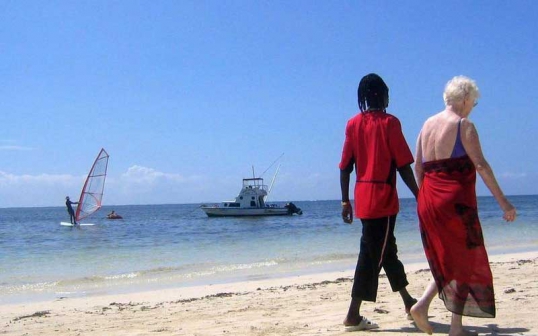
When you look the Kenyan coast, the place is full of foreign tourists. Some fall in love with the ambience, food and people, so much that they never return to their countries of origin. The few who do, remain regular visitors.
But in their endeavour to find love among locals, some end up regretting ever setting foot in Kenya. They end up with experiences characterised by betrayal, court battles over property, nasty separations or divorce cases and in extreme cases murder.
A perfect case in point is a certain Petre, a German national, who fell victim to the 'Mombasa raha' frenzy and ended up losing millions of shillings and now lives like a pauper.
He first visited Ukunda in 1996 for holiday and stayed in luxury hotels and cottages in Diani. Petre now lives in a single-roomed makuti shack. "I stayed at Neptune Beach Hotel for one month. I liked the place and the beaches. I fell in love with Mombasa and I decided to make it an annual visit," says Petre.
He later opted to holiday twice every year in Mombasa. How then did his fortunes crumble?
"In 2003, I came for my holiday as usual. I had a local girlfriend who was staying in Mtopanga, Kisauni. I would sometimes stay at her house but used to shuttle back and forth to the cottages in Ukunda," he explains.
He somehow spent his entire pension on her — and other local women. He is now penniless and spends most of his time at the beaches in Ukunda, acting as a tour-guide in exchange for money from German tourists.
Forced to live like a majority of locals, Petre's life is a far cry from what it was some time back. His life's savings, after retiring from the German fashion industry, evaporated in the coastal heat.
Now he pays Sh400 rent for the room, the beach hotel he so loved is now forgotten. "These days I eat sima (ugali) and sukuma wiki, maharagwe (beans) and mchicha. I like it!" he discloses, adding that he has now embraced the local culture and frequents mnazi (local brew) dens once in a while to unwind.
Born 56 years ago, Petre has been registered as an alien and is learning Kiswahili. Despite the pauper life, he says he will never go back to his country where he left a wife and two children.
Petre is in good company. Another victim is a German woman in her mid-50s who visited the Kenyan Coast, probably to enjoy her twilight years in the serenity of the gateway to East Africa.
Unfortunately, she found herself in the sin city of Mtwapa where readily available sex and a good life awaited. She met a Kenyan man and was immediately struck by his youthfulness and virility — he was in his early 30s and wore dreadlocks. They became lovers.
And because she was 'loaded' and in 'love', she was transparent with her lover boy. She gave him everything money could buy. He knew where the money was and even had access to her bank account.
The two were deeply in love, or so she thought. They bought a house and started a business. But after about a year, she started noticing changes.
"He started spending money without my knowledge and when I asked him about it, he would get angry and threaten to leave me. And because I was in love, I kept quiet," she recalls.
Not long after, she sold a piece of land they had acquired together. "I later realised that the land was registered in his name because the transactions were carried out in his mother tongue in my presence. Upon questioning him, he became so furious that he frightened me into silence," she explains. That marked the end of their relationship.
Another victim of manipulative beach boys and girls has been seen in Mtwapa in the North Coast roasting maize after losing all his fortunes to Kenyan women.
He had gotten himself a string of Kenyan lasses who spent all his fortune, leaving him a pauper. Nowadays, he unwinds at the Uwanja wa Mbuzi area, infamous for its numerous mnazi dens and cheap prostitutes.
The Bombolulu area of Mombasa County is where a number of the fleeced tourists have made home. Starting with the one who got conned within months of arrival, the area has seen an influx of bankrupt wazungu, who can be seen strolling around in bathroom slippers and dirty clothes. Occasionally, they ask for handouts from matatu operators and vegetable sellers.

"We are used to them here (Bombolulu). They even bargain for fare. One was beaten the other day for trying to snatch a woman's bag," says a matatu operator.
Kimberly, another female tourist had to seek legal counsel after her local husband swindled her. The two, who got married at the Attorney General's office in Mombasa, bought a piece of land in Kikambala area of Kilifi County, only for the title deed to appear in his name.
The man, who already had a Kenyan wife, even changed the logbooks of the family cars to his name without her knowledge before vanishing into thin air.
When nosing around for related anecdotes, locals told this writer that some would-be victims have been lucky to escape narrowly.
A local gives an example of Rose, who came five years ago to the country and settled at the Kenyan South Coast. She met and married a local man, but called it quits after weeks when his demands became crazy.
"The Kenyan man demanded that she buys him a car and house while they were still on honeymoon at a villa in South Coast. But because all she wanted was real love and romance, she got so frustrated and ditched him," Philip explains.
The locals have been known to do whatever it takes to net old and moneyed tourists.
In most cases, the beach boys are mostly school dropouts married to local women. Interestingly, their wives have full knowledge of what their men do, but conveniently choose to ignore the philandering for the bigger picture — wealth and a good life.
With the high poverty levels along the Coast, the practice is not only appreciated but also highly encouraged as a 'business enterprise'.
One such man in Mtwapa has amassed wealth after three relationships with white women spanning more than ten years with his wife's knowledge. In one of his 'relationships', his white lover nearly committed suicide after her fortunes ran dry. She had to book the next flight back home upon realising the man was happily married and quite the leech.
"All you have to do is learn a few English, Italian or German words and you are in business," said one beach boy that we interviewed for this story, "then be patient and wait for the opportunity to come."
And as they say, good things come to all those who wait, especially when tourist love insists on being blind.
 The Standard Group Plc is a multi-media organization with investments in media
platforms spanning newspaper print
operations, television, radio broadcasting, digital and online services. The
Standard Group is recognized as a
leading multi-media house in Kenya with a key influence in matters of national and
international interest.
The Standard Group Plc is a multi-media organization with investments in media
platforms spanning newspaper print
operations, television, radio broadcasting, digital and online services. The
Standard Group is recognized as a
leading multi-media house in Kenya with a key influence in matters of national and
international interest.



